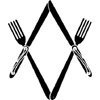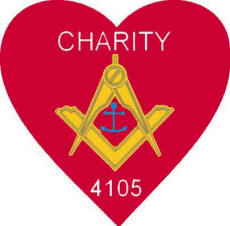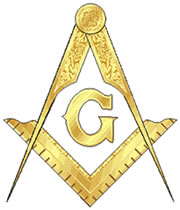For more information, see:
Related Topics:

In recent months, we've been receiving more and more inquiries asking "How much does it cost to join the Masons?" and "Isn't being a Mason expensive?" As housing prices rise, we see a higher posted price every time we fill our car with gasoline, or we hear the dire economic predictions on the news or at our place of employment, this question is not only sensible but very, very proper.
This is NOT one of those situations where "If you have to ask, you can't afford it!" Not by a LONG shot!!! Asking about the price of ANYTHING before you commit makes total and complete sense - and you should never be embarrassed in raising this practical and sensible question.
![]()
Before we get to the details, it's probably important to clarify why some seem to think that Freemasonry is a 'rich man's club'. In days past - three centuries ago when Freemasonry was first taking its present shape - it truly was only those who had some measure of wealth who were able to engage in what might be deemed 'pastimes'. Those who labored for a meager living had scant opportunity to travel and engage in social affairs as their lives were bound to their work - HARD work! As the world changed, though, laborers received more rights including that of more free time and more pay. These changes ushered in the opportunity for many to join clubs and social organizations. Many groups formed for this reason but Freemasonry, having its beginnings far earlier, was seen to be more elitist. Besides: this was a group that YOU had to ask if you wanted to join. Unlike the Moose, the Buffaloes, and so many other clubs and organizations which sometimes even paid 'bounties' on recruiting numbers, the Masons were selective and apart. Many working man may have easily perceived, from the already-established membership and from the fact that they were not being asked to join, that the Masons only wanted the rich. That the membership process was misconstrued was irrelevant: the folklore developed. Then too, some anti-Masons liked to appeal to the 'common man' approach in their screeds, decrying Freemasonry for being a haven for the rich and disregarding the increasingly abundant and public charitable work it performed.
There's a second reason for the confusion surrounding costs: when Freemasonry began - and for the first 225 years of its history, there were NO social welfare programs to help a worker who might become disabled. If you didn't work, you didn't get paid. Your family and friends took care of you - or not! It was a hard life. As pay began to rise, workers began various 'mutual aid' societies whereby they would contribute when they were well and working and then, on their death (or, sometimes, disability), they would receive a benefit payment. Because Freemasonry was a fraternal organization, many thought they could join and share the largesse of their Brother Masons should some tragedy befall them. As a result, Masons became cautious of admitting those who did not have sufficient means to support themselves and their families - once again leading to the perception that one needed to be reasonably well off in order to join. This particular concern still resonates today simply because of the 'welfare mentality' which has developed in many parts of the economy and the world.
![]()
OK. So that's the history - and it's important to understand the basis on which the organization grew over some 300 years. But let's get to the 'nuts and bolts' of this: how much DOES it cost to become a Mason?
The answer is, quite simply: it depends!
When you go to buy a new car or a new suit of clothes, you can certainly ask, "How much does a car/suit cost?" While the person responding may even venture a range based on what HE/SHE is selling (you won't hear a Ford dealer saying that you can spend $285,000....), the truth is that there really is no limit. Automobiles can range from the very inexpensive to the extraordinarily lavish, enhanced by their uniqueness etc. With Freemasonry, the high figure is - essentially - limitless. How much do you want to give to charity? A thousand dollars? Ten thousand pounds? A million rupees?
But wait! You aren't really FORCED to donate to charitable causes - so that's a bit misleading but on the other hand (and remembering the historical part about not relying on Freemasonry to support you or your family), you will feel personally that you should help alleviate suffering and need wherever possible. You will learn in the lessons of Freemasonry that it is necessary to have - as the Bible says - 'faith, hope and charity...but the greatest of these is charity' and from that, there will always be the inner urge to do just a little more for others.
Where do you live =



Freemasonry is not a monolithic organization. The Grand Lodge in your state/province/etc. has no connection (except for recognition) with Grand Lodges outside the territory which your Grand Lodge operates (normally a state/province). And incidentally, the only "Grand Lodge of America" is a 'fake' organization, unrecognized by ANY other group! Be careful.
When joining, there are two immediate financial considerations: initiation/joining fee and annual dues.
The cost of joining includes, in most Grand Lodges, your patent of membership and perhaps some written material. In the United States, it may be anywhere from about $75 on up through about $350. At the time of this writing (late 2007), I'm not aware of any joining fee that is in excess of this amount. Let me know if there is, please! Generally, you'll find it to be in the $125-175 range in the US. Other countries vary.
As with any other organization, annual dues are collected. These are usually quite modest, particularly in comparison with a sports club membership, for example. Again, in the US, the amount may be from under $50 up through perhaps $225 annually. (Note: bogus groups, particularly in the US African-American community, pretending to be a Masonic organization will want to collect dues on a monthly basis. Beware!)
Obviously the easiest way to find out the amount of lodge dues is - ask the lodge! I can tell you what the amount of dues is in MY lodge but I don't keep track of the dues at the lodge in the next town - or in some other country. Sorry.
 In
the UK and other areas, there is also an expectation that lodge members will
dine together on the night of the meeting. In the US, meals are often held but
it's an optional thing. (In England, for example, there will likely be only 4
meetings per year while in the US, there may well be 9-10.) The cost of the
subscription is an additional, added expense but the food will nearly always be
of better quality and of lower price than you would find commercially. Those who
prepare meals for Masonic meetings take particular pride in keeping the Brethren
well fed. You won't go away hungry - or disappointed! In the US, some lodges
have extravagant meals while others will have more pedestrian fare. Regardless,
the opportunity to break bread with other Masons is an opportunity that is just
another aspect of building Brotherhood amongst the members.
In
the UK and other areas, there is also an expectation that lodge members will
dine together on the night of the meeting. In the US, meals are often held but
it's an optional thing. (In England, for example, there will likely be only 4
meetings per year while in the US, there may well be 9-10.) The cost of the
subscription is an additional, added expense but the food will nearly always be
of better quality and of lower price than you would find commercially. Those who
prepare meals for Masonic meetings take particular pride in keeping the Brethren
well fed. You won't go away hungry - or disappointed! In the US, some lodges
have extravagant meals while others will have more pedestrian fare. Regardless,
the opportunity to break bread with other Masons is an opportunity that is just
another aspect of building Brotherhood amongst the members.
At some point, you may wish to become a lodge officer and progress to the position of Master. Some lodges require that all of their officers wear tuxedos/morning suits, some require it for only the top three officers, and some have no such requirement. If you don't have formal wear, you can find it inexpensively and sometimes second hand from those firms which do rentals. If you're single, there's NOTHING that will impress a woman as much as when she invites you to some 'fancy event' and you ask, very casually, "Should I wear my tux?" as if it was the most natural thing in the world! <From personal experience.....> This is, then, a POSSIBLE additional expense that you may or may not wish to bear.
While those in YOUR lodge may not wear suits at their meetings, it is considered a courtesy to wear one when visiting elsewhere. ("When in Rome...."). Thus, if you don't have a dark suit, this too may be an expense you will bear - but in the final analysis, it will be for funerals, weddings, and other events where a sports shirt and slacks would be less than expected.

Then there is the other part of the equation: charity!
In our present day, Masonic lodges perform MANY charitable works - many more, in fact, than the general public may ever see. Sometimes there are internal debates about whether the organization has become nothing more than a 'service club'. That notwithstanding, Masons are always raising funds for an ambulance service or helping out a local food pantry and it always seems as if there's a collection for a few dollars/pounds/<insert local currency here> to add to the project. When a collection is being taken, you might feel uncomfortable simply staring at your shoes and it is for that reason, we've generally told those inquiring that they should feel comfortable that they have at least some 'disposable income'. If you're only meeting monthly expenses or are anticipating some large cash outlay in the near future, you
should certainly be attending to those matters rather than attempting to join Freemasonry at this point.
How much does an average Mason donate to Masonic charities each year? It's impossible to say and although we can extrapolate an average, the median would be FAR different due to the widely varying financial circumstances of members. Many men make provisions in their wills for a donation to one or more Masonic charities and this skews the averages as well. Suffice it to say that if you're only 'making ends meet', you really should not be considering a cash outlay on this. It is also VERY
important to note that your VERY FIRST priority is to your family and you should NEVER take funds from them to join/continue with Freemasonry.
And finally, it's important to understand that for ALL of us, sometimes money becomes a major issue. Job loss or unexpected medical bills can put anyone into a bad spot no matter how much preparation you do. When this happens, a quiet word to the Lodge's Master can cause your dues to be temporarily remitted and, if necessary, perhaps find some assistance to your problem.
Has this helped? We hope so. If not - or you see ways to change and improve, please do let us know!

Note: The heart graphic is from Lodge of Charity, #4105 of the United Grand Lodge of England.






